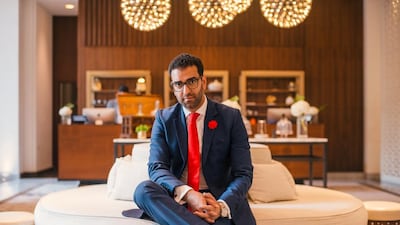More than 100 lawyers are taking part in a pro bono programme that provides free legal advice to low income workers who want to have their cases heard in court.
DUBAI // While designer-suited professionals close out mega deals in the polished towers of the Dubai International Finance Centre, hundreds of the free zone’s mistreated blue-collar workers are seeking justice, thanks to a group of lawyers offering their services free of charge.
Forty-three registered law firms and more than 100 legal practitioners are taking part in the Academy of Law’s pro bono programme, offering free legal advice and representation to those in financial need.
One of those lawyers is 34-year-old Shiraz Sethi, from the firm Stephenson Harwood.
“There are a lot of people who work in the DIFC who are low-paid workers and do not have the means to seek legal advice. I’m an employee, I know I wouldn’t want to be treated in a way that some of these individuals are.”
An increasing number of low-income workers are using the programme, which operates under the DIFC court’s jurisdiction and in conjunction with the DIFC’s dispute resolution authority.
When Indians Sekh Abdul Sattar, 24, and Khaledin Azam Molla, 36, were let go from their jobs at a DIFC restaurant, they were left with no money and a long way from home.
They had grievances with their employer, which was also withholding weeks worth of their wages.
The men were not provided with copies of their contracts, had their passports withheld, and despite having never been reprimanded over on-the-job performance, their superior issued a string of warnings over a 20-day period in March before sacking them.
“My two-year contract finished but the company refused to clear our payable dues,” said Mr Molla. “On the contrary, it demanded I pay Dh4,960, which the company spent on obtaining the motorbike driving licence.”
Their fortunes changed when they found out about the pro bono programme.
After visiting one of its weekly clinics, where they met Mr Sethi, they qualified for financial aid to have their case heard in court.
With the lawyer pleading their case, the men were awarded thousand of dirhams in unpaid wages and air tickets back home.
“They had no money. They were sending money home to India and had nothing to eat or drink or couldn’t travel. I really wanted to help them,” Mr Sethi said.
His firm devoted more than 40 hours to the case.
About 100 low-income workers have received legal assistance during the first three months of this year, and the overall case load is on track to double from 2014.
Last year, 350 people took advantage of the volunteer-run programme, predominantly with cases related to employment and property rental issues.
The Academy of Law is a separate entity working with the financial centre’s dispute resolution authority, also providing legal regulation and education services.
Ms Delvin Sumo, a legal conduct officer with the academy who is responsible for the programme’s operations, said it hadexpanded this year, with an increase in the number of face-to-face legal clinics and volunteer lawyers.
“We started noticing that the demand was very high,” she said. “I think the reason for that is publicity, because the programme has been taken to the people and they are more aware of it.”
While the DIFC dispute resolution authority mostly focuses on regional and global commercial transactions, the academy’s director, David Gallo, said they also sought to promote socially responsible initiatives.
“Providing legal services to people needing financial support is an important way to broaden access to justice,” he said. “Our interest in developing the programme stems from our broader sense of responsibility to contribute to the development of the rule of law, the legal system, and the legal community in Dubai and the UAE.”
Mr Gallo said the academy hoped to further improve access to justice for low-income residents by supporting similar programmes that exist within the larger legal systems of Dubai and Abu Dhabi, which operated in Arabic under separate UAE federal laws.
“We were the first pro bono programme in the region, and, factually speaking, it is well developed. We really are looking to try to assist other jurisdictions and other emirates in the development of their own programmes,” he said.
esamoglou@thenational.ae
* With additional reporting from Anwar Ahmad

